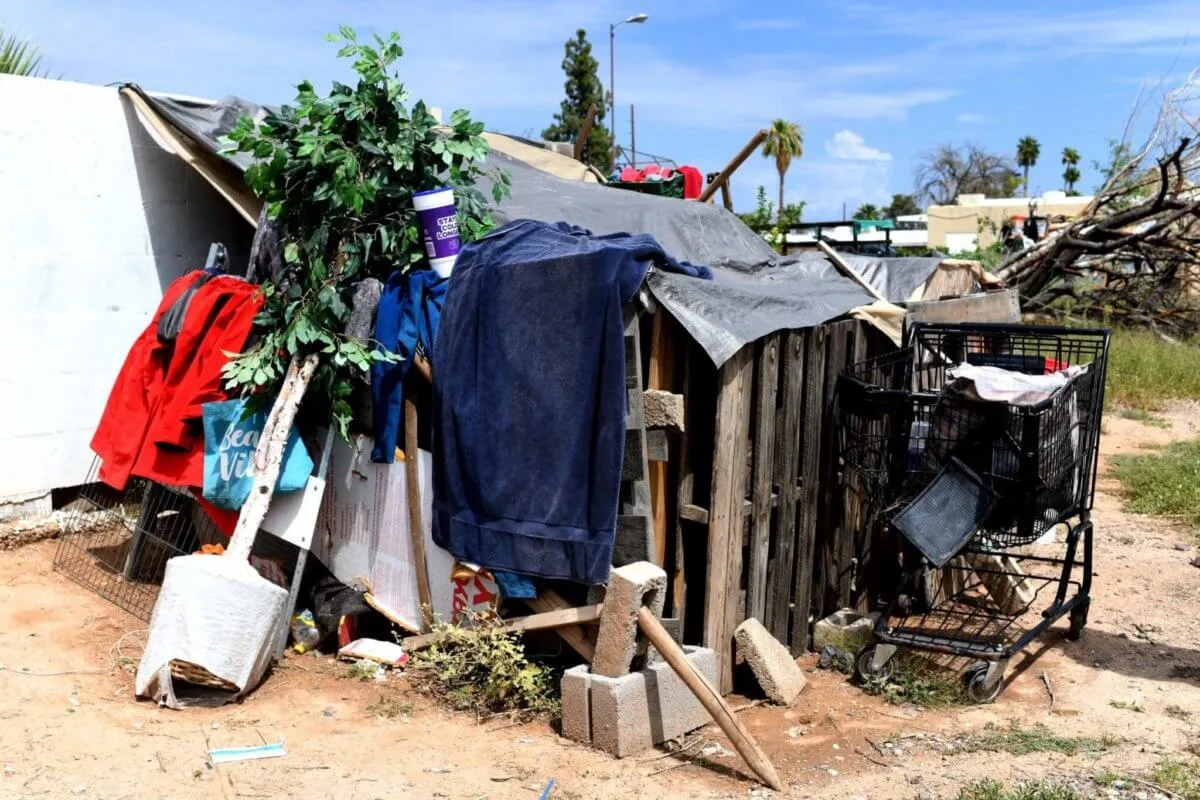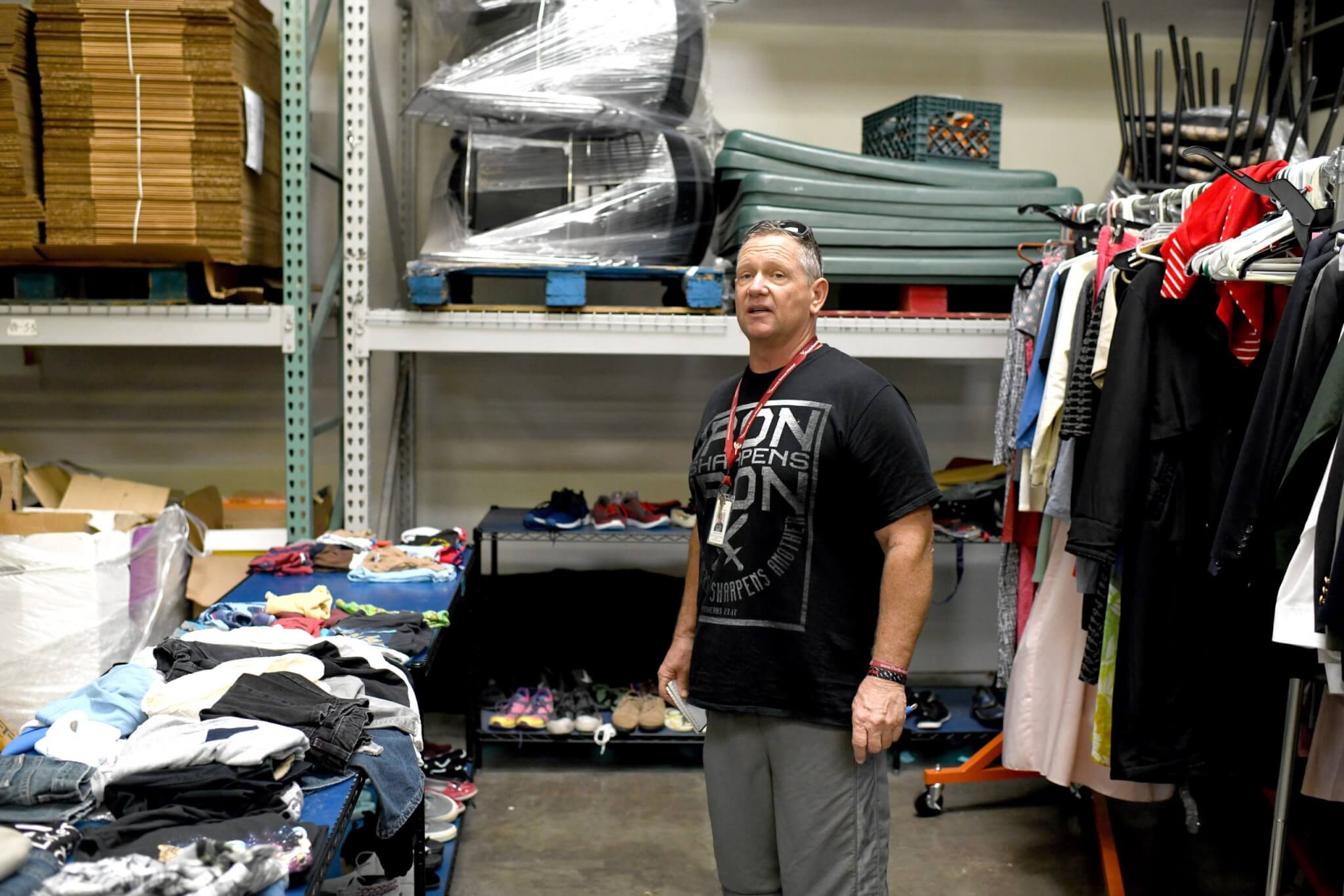
(Photo by Kevin Hurley/Cronkite News)
On any given night across the state last year, about 11,000 people experienced homelessness.
PHOENIX – The number of people experiencing homelessness in Arizona and across the U.S. has risen in past years, and experts worry that many more Americans will find themselves without a roof over their heads because of the economic effects of the pandemic and the recent end to the federal eviction moratorium.
Every day in Maricopa County, 14 people hit the streets to help as part of the Phoenix Rescue Mission’s Hope Coach Mobile Outreach program. And from July through October, they helped move 123 people into housing.
Jussane Goodman, director of community engagement for the Rescue Mission, attributes the program’s success to its focus on delivering hope to those in need, by way of the distribution of essentials, particularly water and socks.
But what really makes this program different, she said, are the personal relationships that case managers form with clients.
RELATED: Arizona Housing Advocate Says Build Back Better Plan Could Effectively End US Homelessness
“The case managers,” Goodman said, “they are the true rock stars of this program.”
Hope Coach workers drive to all corners of the county and engage with people to build trust.
What sets them apart? Lived experience.
Yvette Syverson and Steve Harmon both were homeless before going to work for the Rescue Mission. They now try to help people whose stories are all too similar to their own.
Syverson, 50, joined in April. She previously served in the Army and Navy, but a longstanding battle with mental health left her homeless for a period of time.

“I began to struggle with suicidal ideations at the age of 19,” she said. “I’ve struggled most of my adult life.”
Eventually, Syverson landed before a judge, who ordered her into therapy and counseling. After receiving the help and education she needed, Syverson now dedicates her life to helping other people who suffer from mental illness.
Harmon, 56, once worked in construction but served four prison terms on drug-related offenses and often found himself homeless when he wasn’t behind bars.
“I’d always have that idea in my head towards the end of my sentence, wanting to do better, wanting more, wanting a truck, wanting a job, wanting a place to live, and I kept getting doors slammed in my face,” he said.
He started working as a Hope Coach case manager in 2020. The program uses donated items to put together “Hope Totes,” bags filled with hygiene products, clothing and water.

Harmon said socks are among the most coveted items, because people experiencing homelessness often have to walk a lot to get to different service locations. As a result, their shoes and socks get worn down faster, causing foot injuries.
When someone experiencing homelessness walks with a limp or a gait, outsiders may assume he or she is drunk or using drugs, but it might just be that their feet are sore, Harmon said.
“I’m able to take the things that I’ve been through … and I’m able to turn that into something good,” he said. “It took me a long time to get to this moment. I found my peace in God.”
Arizona’s homeless population increased about 23% from 2017 to 2020. On any given night across the state last year, about 11,000 people experienced homelessness.
RELATED: Here Are Some Ways to Give Back in Arizona This Holiday Season
Nationally over that same period, the homeless population increased about 5%, and some 580,000 people experienced homelessness in 2020. Because of the pandemic, 2021 homeless counts were canceled.
Goodman said people experiencing homelessness often are wary of people approaching them in their personal space, fearing their intentions are hostile or that they’ll call the police.
Because of their own past experiences, Hope Coach case managers can break through those barriers.
Said Goodman: “To go out there and to tell someone, ‘I know exactly what you’re going through’ … is a really, really strong tool.”
Looking for the latest Arizona news? Sign up for our FREE daily newsletter.

He said what? 10 things to know about RFK Jr.
The Kennedy family has long been considered “Democratic royalty.” But Robert F. Kennedy, Jr.—son of Robert F. Kennedy, who was assassinated while...

Here’s everything you need to know about this month’s Mercury retrograde
Does everything in your life feel a little more chaotic than usual? Or do you feel like misunderstandings are cropping up more frequently than they...

Arizona expects to be back at the center of election attacks. Its officials are going on offense
Republican Richer and Democrat Fontes are taking more aggressive steps than ever to rebuild trust with voters, knock down disinformation, and...

George Santos’ former treasurer running attack ads in Arizona with Dem-sounding PAC name
An unregistered, Republican-run political action committee from Texas with a deceptively Democratic name and ties to disgraced US Rep. George Santos...




